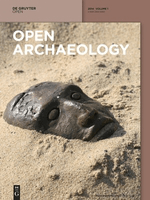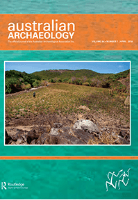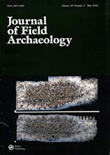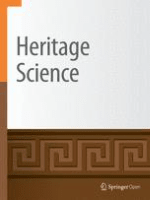
Open Archaeology
Scope & Guideline
Preserving Heritage, Sharing Insights
Introduction
Aims and Scopes
- Interdisciplinary Research:
The journal encourages the application of methodologies from various fields such as anthropology, history, and environmental science to enhance archaeological interpretations. - Technological Integration:
Open Archaeology highlights the use of advanced technologies, including 3D modeling, digital archaeology, and data analysis techniques, to document and analyze archaeological materials and sites. - Microhistorical Approaches:
A significant focus on microhistory allows for detailed examinations of local contexts and the everyday lives of individuals and communities in the past. - Cultural and Social Dynamics:
Research often explores the social structures, cultural practices, and economic interactions within historical communities, emphasizing the complexities of human behavior over time. - Environmental Interactions:
The journal addresses human-environment relationships, examining how past societies adapted to and transformed their landscapes.
Trending and Emerging
- Digital Archaeology and Virtual Reality:
The integration of digital tools and virtual reality in archaeological practice is rapidly growing, allowing for innovative ways to visualize and engage with archaeological data. - Microhistorical and Contextual Analyses:
There is an increasing emphasis on microhistorical approaches that seek to understand local histories and individual experiences, contributing to a richer narrative of the past. - Sustainability and Circular Economy in Archaeology:
Emerging research explores sustainability practices and the concept of circular economies in historical contexts, linking past practices to modern sustainability challenges. - Interdisciplinary Collaboration:
Collaboration across disciplines is on the rise, with archaeology increasingly intersecting with fields like sociology, ecology, and technology to produce more comprehensive studies. - Human-Animal Relations:
Research focusing on the relationships between humans and animals, including domestication patterns and symbolic interactions, is gaining traction, reflecting broader interests in ecological and social dynamics.
Declining or Waning
- Traditional Pottery Studies:
Research focusing solely on traditional pottery styles and classifications has decreased, as scholars increasingly integrate broader contextual analyses and technological methods. - Standardized Excavation Reports:
The trend towards detailed, standardized excavation reports has diminished, with a shift towards more narrative-driven and interpretative approaches that emphasize storytelling over mere documentation. - Regional Focus in Isolation:
Studies that concentrate solely on specific regions without broader comparative analyses are becoming less common, as researchers seek to understand global patterns and interactions. - Static Historical Narratives:
There is a noticeable decline in research that presents static historical narratives; contemporary archaeology favors dynamic interpretations that consider multiple perspectives and complexities.
Similar Journals

Complutum
Advancing Knowledge in Archeology and HistoryComplutum, published by the Universidad Complutense de Madrid, serves as a leading academic journal in the fields of Archeology and History. With a notable track record since its inception and a convergence stretching from 2011 to 2024, the journal has established itself as a pivotal platform for scholarly discourse in these disciplines. Recognized in 2023 with a Q2 ranking in Archeology and Arts and Humanities, as well as a Q1 ranking in History, Complutum demonstrates its commitment to quality research, attracting contributions from leading experts and emerging scholars alike. The journal's impact is further evidenced by its competitive ranks within various Scopus categories, particularly its placement in the 77th percentile for History and 64th for Archeology. As a printed publication without open access options, Complutum caters to a specialized audience, providing a forum for in-depth analysis and discussion on archaeological findings and historical interpretations. Researchers, professionals, and students engaged in these fields will find Complutum an invaluable resource for advancing knowledge and fostering academic collaboration.

Virtual Archaeology Review
Exploring New Frontiers in Archaeology and Conservation.Virtual Archaeology Review, published by UNIV POLITECNICA VALENCIA, EDITORIAL UPV, is a distinguished open-access journal dedicated to the dynamic fields of archaeology and conservation. Based in Spain, this journal has made a significant impact in the academic community, reflected in its outstanding Q1 ranking in Archeology and Conservation for 2023, alongside impressive standings in related disciplines such as Computer Science Applications. With an active commitment to promoting the accessibility of knowledge since 2010, it provides a platform for researchers, professionals, and students to share innovative findings and methodologies in virtual archaeology, fostering collaboration across disciplines. The journal's impact factor and its strategic focus on advancing the practice of virtual methodologies in archaeology underscore its vital role in bridging technology and heritage studies. By embracing a multidisciplinary approach, Virtual Archaeology Review not only enhances academic discourse but also drives the development of effective conservation strategies, making it an essential resource for those dedicated to the preservation and appreciation of our cultural heritage.

Archaeologies-Journal of the World Archaeological Congress
Bridging Disciplines, Uncovering StoriesArchaeologies: Journal of the World Archaeological Congress is a premier academic journal published by Springer, focusing on the dynamic and interdisciplinary field of archaeology. With an ISSN of 1555-8622 and an E-ISSN of 1935-3987, this journal serves as a significant platform for the dissemination of innovative research, theory, and practice within the archaeological community. Hailed for its rigorous peer-review process, Archaeologies consistently ranks in the 74th percentile among its peers, currently holding a Q2 category placement in the field of archaeology as per the 2023 Scopus rankings. The journal publishes original articles, critical essays, and case studies that emphasize the cultural, historical, and methodological aspects of archaeological research from a global perspective. As a key resource for researchers, professionals, and students alike, Archaeologies facilitates critical dialogue and enhances understanding of humanity's past through archaeology. Although the journal is not open access, it provides various subscription options to ensure its valuable content remains accessible to its diverse audience.

Journal of Maritime Archaeology
Innovative Insights into Maritime Cultural HeritageThe Journal of Maritime Archaeology, published by Springer, is a premier scholarly platform dedicated to advancing the understanding of maritime cultural heritage and underwater archaeology. With an ISSN of 1557-2285, this journal has continuously contributed to the field since its inception in 2006 and is set to celebrate its evolution until 2024. Holding a distinguished position as a Q1 journal in the field of Archaeology (Arts and Humanities) as of 2023, it ranks impressively at #96 out of 413 journals in its category, placing it in the 76th percentile of its field. This journal aims to disseminate high-quality research that explores the interplay between maritime environments and human activities, showcasing innovative methodologies, historical narratives, and cultural analyses. Researchers, professionals, and students engaged in maritime studies will find this journal an invaluable resource for advancing knowledge and fostering international collaboration in this vital area of archaeology.

ARCHAEOLOGY IN OCEANIA
Advancing Archaeological Insights from the PacificARCHAEOLOGY IN OCEANIA, published by Wiley, is a leading journal that delves into the rich and diverse archaeological landscape of the Pacific region. With a commitment to advancing knowledge in anthropology and archaeology, this esteemed publication has been pivotal in shaping scholarly discussions since its inception in 1966. Spanning generations of research, it has seen converged years of publication from 1966 to 1980 and from 2002 to 2024. With an impressive Scopus ranking placing it in the top quartiles across multiple categories - including Q2 in Anthropology and Q1 in Archeology (arts and humanities) - the journal distinguishes itself as a must-read for researchers, professionals, and students alike. Although it operates on a subscription model, its rigorous peer-reviewed articles and comprehensive studies contribute significantly to understanding the past of Oceania, making it an essential resource for those invested in this vibrant field of study.

AUSTRALIAN ARCHAEOLOGY
Unearthing Australia’s Rich Heritage.AUSTRAILIAN ARCHAEOLOGY, published by Taylor & Francis Ltd, is a leading academic journal dedicated to the field of archaeology. With a strong reputation as evidenced by its Q1 ranking in both the Arts and Humanities and Social Sciences categories, this journal fosters the growth and dissemination of pioneering research from diverse archaeological contexts. The journal has been a vital resource for scholars and practitioners since its convergence in 2002, supporting the collective advancement of knowledge in the archaeological discipline. By offering a platform for rigorous analysis and critical discussions, AUSTRAILIAN ARCHAEOLOGY appeals to a wide audience, from established researchers to students beginning their journey in archaeology. Although it is not an Open Access journal, the insights provided are invaluable for enhancing understanding and appreciation of Australia’s rich archaeological heritage. With a Scopus ranking that places it among the top contenders in its field, this journal continues to contribute significantly to outstanding archaeological scholarship and professional practice.

JOURNAL OF FIELD ARCHAEOLOGY
Transforming Archaeological Inquiry into Impactful KnowledgeJOURNAL OF FIELD ARCHAEOLOGY, published by Routledge Journals, Taylor & Francis Ltd, is a premier scholarly publication dedicated to advancing the field of archaeology. With an impressive impact factor reflecting its significant contributions to both the arts and humanities, this journal ranks in the Q1 category for archaeology, with a remarkable position of #21/413 in the arts and humanities realm and #19/354 in social sciences, placing it in the 95th percentile among its peers. Catering to researchers, professionals, and students alike, the journal has continuously explored critical archaeological questions since its inception in 1974, with a commitment to disseminating high-quality research and innovative methodologies up to the present. Although it operates under a traditional access model, the journal engages a broad readership with its insightful studies and findings, making it an essential resource for anyone deeply involved in archaeology and its related disciplines.

Epohi
Fostering Innovation in Social Sciences and Humanities.Epohi is a distinguished academic journal published by the St Cyril and St Methodius University Publishing House, focusing on interdisciplinary research in the fields of social sciences and humanities. With its ISSN 1310-2141 and E-ISSN 2534-8418, the journal aims to provide a platform for innovative thought and scholarly discourse, bridging gaps between historical perspectives and contemporary issues. While currently exploring open access options to enhance accessibility, Epohi remains a pivotal resource for researchers, professionals, and students seeking to contribute to and engage with cutting-edge research. Situated in the serene locale of Veliko Tarnovo, Bulgaria, this journal not only enriches the academic landscape but also fosters collaboration and professional growth in the broader scholarly community.

Heritage Science
Fostering Critical Discussions in Heritage ScienceHeritage Science is a prestigious open-access journal, published by Springer since 2013, dedicated to the fields of heritage conservation and archaeology. With an ISSN of 2050-7445, it offers a platform for innovative research and critical discussions, encompassing interdisciplinary approaches that bridge the gap between art, science, and technology. The journal proudly ranks in the Q1 category for both Archaeology (arts and humanities) and Conservation, highlighting its influence and reputation within these scholarly realms. Furthermore, its presence in Scopus with impressive percentile rankings—such as #7 in Conservation and #23 in Archaeology (arts and humanities)—asserts its role as a leading voice in heritage studies. The journal's commitment to open access enhances the dissemination of knowledge, making it an essential resource for researchers, professionals, and students engaged in the preservation and interpretation of cultural heritage. Heritage Science continues to set standards in research quality, encouraging contributions that advance the understanding and sustainability of our shared heritage.

International Journal of Historical Archaeology
Fostering Interdisciplinary Dialogue: Shaping the Future of Archaeological ResearchInternational Journal of Historical Archaeology, published by SPRINGER, stands at the forefront of archaeological scholarship, focusing on the intricate relationship between historical events and archaeological findings. With an impressive impact factor underscored by its ranking in the Q1 quartiles across various categories, including Archeology and History, this journal serves as a premier platform for researchers, professionals, and students alike to disseminate groundbreaking findings and theoretical advancements in the field. Although it is not an Open Access publication, the journal provides valuable insights through its rigorous peer-review process, enhancing the quality of contributions. Covering a breadth of topics from 1997 to 2024, it is vital for advancing knowledge in historical archaeology and offers an essential resource for those invested in understanding our shared past through the lens of material culture. The journal's commitment to fostering interdisciplinary discussions enriches the scholarly community and supports the evolution of methodologies and perspectives within the domain.